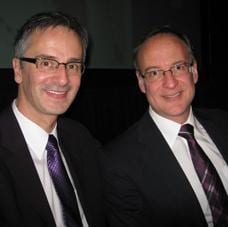In some ways, Marco Fiola knew exactly what he was getting into when his husband, Rob Oliphant, ran for the Liberal Party in Don Valley West and won in 2008.
“I was prepared to some extent to be the partner of someone who has to deal with a large number of people because Rob was a United Church minister in a large, affluent congregation in Toronto,” Fiola says.
“Before being the Member of Parliament’s spouse, I was the minister’s spouse. So it was a bit of a demotion,” Fiola jokes.
But aside from going from a 1200-member congregation to a 120,000-person riding, there are nevertheless a number of similarities.
“Larger group, people with different needs from different backgrounds with different expectations, but my role as support is pretty much the same,” Fiola says. “The life of an MP is different because of the travelling.”
Fiola, a linguistics and translation professor at Ryerson University, has been with Oliphant for 18 years. Born in Rimouski, Quebec, Fiola describes himself as a lifelong Liberal for whose family the biggest stretch was his marrying a Protestant minister when he’d been raised Roman Catholic.
Fiola and Oliphant had some experience at being a couple that commutes, given that Fiola had a teaching job in Hull, Quebec, between 2001 and 2006. By the time he was back in Toronto and the pair were again living together full-time, Oliphant was involved in politics and soon won the seat. Now it is Oliphant who spends four days a week in Ottawa.
“It’s an exercise in scheduling,” Fiola says. “It’s very hard on our friends because there’s no room for spontaneity. You can’t say ‘Oh, why don’t you just come over and we’ll have drinks and order pizza’ or something. They can still do that, but chances that we’ll be included in those kinds of impromptu gatherings are pretty slim.
“It takes a lot of reorganizing, so it also means when Rob is in Toronto, we have to maximize that time together and that time with our friends and with our families. We have nieces and nephews who can get a glimpse of their uncle once in a while or talk to him a little bit over the phone.”
Even with Oliphant back in the riding, there are constituency duties to take care of — especially during weeks when the House isn’t sitting in Ottawa such as during the winter break.
“They’re not on holidays for six weeks — they’re away from Ottawa for six weeks, and they’re in the constituency office for six or seven days a week,” Fiola says.
“People think that MPs do nothing for those six weeks or do nothing in the summer. No. Rob has staff scheduling him in Ottawa, and when he’s not in Ottawa, he’s got staff scheduling him for activities in the riding, so when he gets to the riding, then he’s busy in the riding constantly. Which means we don’t have a lot of free time — we have to schedule free time, which we do.”
As a political spouse, Fiola does what he can to join in during social events, but because of his own career, he is not one of the full-time political spouses who travel to Ottawa on a regular basis. As well, there is still a bit of novelty around “political husbands” instead of wives, let alone being the husband of a gay MP.
“The Parliamentary Spouses Lounge has one bathroom with no urinals, so you understand that men were not supposed to be involved,” Fiola says. “Men were the political people and their wives had a lounge where they could entertain. Now I’ve been there once, because we used the lounge for Rob’s swearing-in ceremony, a little cocktail reception afterwards.”
He also points to a coincidental oddity — that of the three out Liberal MPs, all have partners or husbands who are French Canadian whose names start with the letters MA.
“Martin, Maxime and Marco, we’re all very different,” Fiola says, referring to Mario Silva’s partner, Martin Forget, and Scott Brison’s husband, Maxime St Pierre.
“Maybe we’re a new breed of political spouses. Maybe we’re more what it’s going to be like in the years to come. I guess we’re odd right now. When the security guards see my little [spouse’s] pin, they say, ‘Who’s your spouse?’ and I say, ‘Rob Oliphant,’ and they say, ‘Oh.’ Not that they’re disappointed, but it’s not necessarily the answer they expected.”
Who might they have been expecting?
“Something like Rona Ambrose or something,” Fiola laughs.
The pervasive attitude that Parliamentary spouses are mainly women is something that can be found in the newsletters of the Parliamentary Spouses’ Association, run by Stockwell Day’s wife, Val. Fiola counts himself as a member and talks about one particular newsletter where Day offered fashion tips.
“If I wanted to be ‘in,’ I was supposed to get cut-off pants,” Fiola recounts. “Not capris, because capris were 2008, which was wrong in 2009 — so a little bit longer, and at least one dress, off the shoulder, and lots of pearls. Lots of pearls.”
Nevertheless, he does profess a certain admiration for Day.
“I’ve never met Val, but from what I read, I want to meet Val,” Fiola says. “She must be such a delight. I think she’s a very positive, cheerful person from what I read, but I don’t know anything other than that.”
Nevertheless, Fiola does see a role for groups like the Spouses’ Association for those spouses who can’t make it to Ottawa often and who may need support or guidance.
“I’m sure I could use some guidance: tips, and dos and don’ts. Like don’t give an interview without your lawyer present,” he says with a laugh.


 Why you can trust Xtra
Why you can trust Xtra


